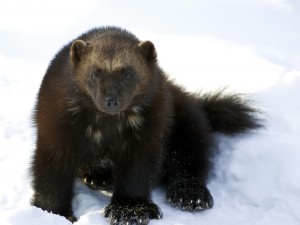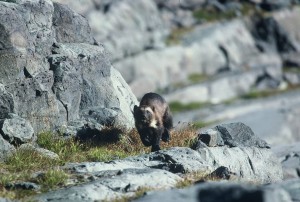If you’ve been keeping up with one of the world’s toughest animals, the wolverine, you may know that a big decision is coming their way. In early August, the U.S. Fish and Wildlife Service will determine whether or not imperiled wolverines in the lower-48 will be listed under the Endangered Species Act (ESA) as “threatened.”
The Service previously found that the wolverine warranted ESA protection in 2010 and proposed to list this species as threatened in February of 2013. However, according to a memo that was leaked to the press last week, the Service’s Regional Director based in Denver has now overruled and rejected the Service’s own Field Office’s recommendation to list wolverines as threatened. The Regional Director’s memo suggests that the continental U.S.’s remaining 250-300 wolverines are not ripe for listing due to uncertainty about the effects of climate change on the animals. Even though a final decision on the wolverine’s fate is not due until August 4th, we can’t help but speak out now.

Defenders strongly disagrees with the regional recommendation to withdraw the wolverine’s listing proposal. It is premature to be so dismissive of the effects of climate change on wolverines, but with or without the threat of climate change, the wolverine is in dire need of protection under the ESA. And this is something we have believed for over a decade. We and other conservation allies filed the original petition to list the species back in July of 2000. At the time, climate change was not yet understood to present a serious threat to the wolverine, so it was not even listed as one of the major threats that we identified as the basis for listing the species.
Threats that continue to jeopardize the wolverine’s fate into the future include the species’ small population size, low genetic diversity, and direct or indirect impacts from trapping, winter recreation, and habitat alteration. These threats are even more important due to shrinking habitat from the loss of persistent snowpack across much of the West. The Service’s suggestion that the wolverine is not ripe for listing due to uncertainty about the effects of climate change on the species ignores how serious other threats to the wolverine are, as well as the fact that wolverines depend on deep, persistent snowpack for den sites and that snow levels in the West are expected to decline over time.
Sadly, biologists estimate there are only a few dozen breeding female wolverines in the lower 48 states in any given year. Wolverines also have one of the lowest successful reproductive rates known to mammals. These facts help explain why scientists estimate the effective population size – the portion of the population that contributes to the next generation – to be just 28- 52.

Populations of wolverines this small are highly vulnerable, regardless of potential impacts of climate change on the species. In fact, under International Union for Conservation of Nature standards, a widely accepted scientific benchmark, a species with fewer than 250 mature individuals is considered endangered rather than merely threatened.
Getting wolverines under federal protections should end the directed wolverine trapping season in Montana and could help wolverines recolonize habitat they once occupied prior to their near-elimination the 1900s – like high elevation mountain ranges in Colorado and California that currently have great wolverine habitat but no wolverines. And protections would help mitigate some of the other threats as well.
The fate of wolverines remains highly uncertain, but the case for action is clear. With so many threats to the 250-300 wolverines in the lower 48 states, we must protect them under the ESA.
Jay Tuchton is a Staff Attorney for Defenders of Wildlife

